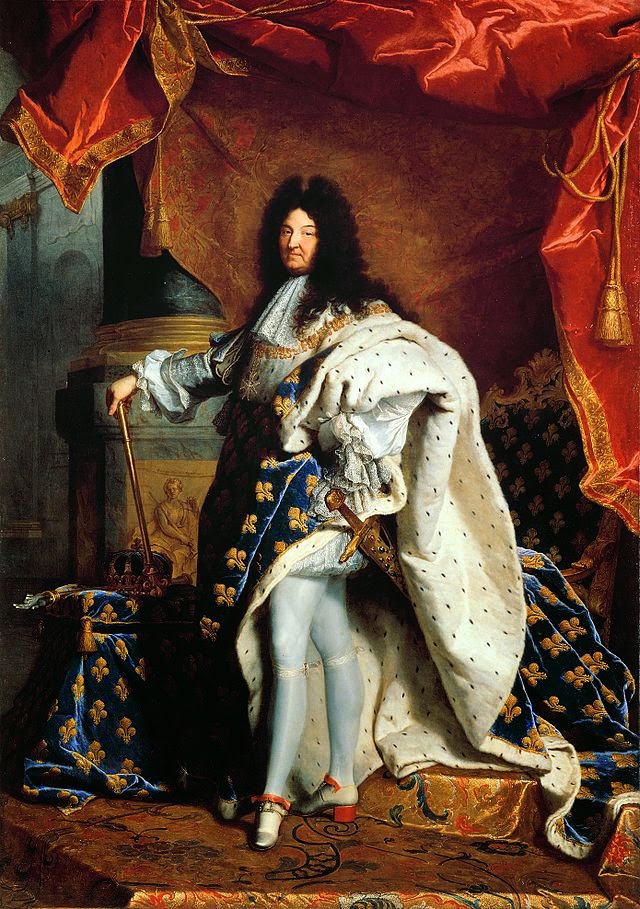Louis XIV’s kingly power soared, single and supreme, over prostrate foes.
Continuing Louis XIV Establishes Absolute Monarchy in France,
our selection from an article in The Fortnightly Review, Volume 21 by James Cotter Morison published in 1866. The selection is presented in seven easy 5 minute installments. For works benefiting from the latest research see the “More information” section at the bottom of these pages.
Previously in Louis XIV Establishes Absolute Monarchy in France.

Public domain image from Wikipedia.
The flames of insurrection which had shot up, forked and menacing, fell back underground, where they smouldered for four generations yet to come. The kingly power soared, single and supreme, over its prostrate foes. Long before Louis XIV had shown any aptitude or disposition for authority, he was the object of adulation as cringing as was ever offered to a Roman emperor. When he returned from his consecration at Rheims, the rector of the University of Paris, at the head of his professorial staff, addressed the young King in these words: “We are so dazzled by the new splendor which surrounds your majesty that we are not ashamed to appear dumfounded at the aspect of a light so brilliant and so extraordinary”; and at the foot of an engraving at the same date he is in so many words called a demigod.
It is evident that ample materials had been prepared for what the vulgar consider a great reign. Abundant opportunity for an insolent and aggressive foreign policy, owing to the condition of Europe. Security from remonstrance or check at home, owing to the condition of France. The temple is prepared for the deity; the priests stand by, ready to offer victims on the smoking altar; the incense is burning in anticipation of his advent. On the death of Mazarin, in 1661, he entered into his own.
Louis XIV never forgot the trials and humiliations to which he and his mother had been subjected during the troubles of the Fronde. It has often been remarked that rulers born in the purple have seldom shown much efficiency unless they have been exposed to exceptional and, as it were, artificial probations during their youth. During the first eleven years of Louis’ reign–incomparably the most creditable to him–we can trace unmistakably the influence of the wisdom and experience acquired in that period of anxiety and defeat. He then learned the value of money and the supreme benefits of a full exchequer. He also acquired a thorough dread of subjection to ministers and favorites–a dread so deep that it implied a consciousness of probable weakness on that side. As he went on in life he to a great extent forgot both these valuable lessons, but their influence was never entirely effaced. To the astonishment of the courtiers and even of his mother he announced his intention of governing independently, and of looking after everything himself. They openly doubted his perseverance. “You do not know him,” said Mazarin. “He will begin rather late, but he will go further than most. There is enough stuff in him to make four kings and an honest man besides.”
His first measures were dictated less by great energy of initiative than by absolute necessity. The finances had fallen into such a chaos of jobbery and confusion that the very existence of the government depended upon a prompt and trenchant reform. It was Louis’ rare good-fortune to find beside him one of the most able and vigorous administrators who have ever lived–Colbert. He had the merit–not a small one in that age–of letting this great minister invent and carry out the most daring and beneficial measures of reform, of which he assumed all the credit to himself. The first step was a vigorous attack on the gang of financial plunderers, who, with Fouquet at their head, simply embezzled the bulk of the state revenues. The money-lenders not only obtained the most usurious interest for their loans, but actually held in mortgage the most productive sources of the national taxation: and, not content with that, they bought up, at 10 per cent. of their nominal value, an enormous amount of discredited bills, issued by the government in the time of the Fronde, which they forced the treasury to pay off at par; and this was done with the very money they had just before advanced to the government.
Such barefaced plunder could not be endured, and Colbert was the last man to endure it. He not only repressed peculation, but introduced a number of practical improvements in the distribution, and especially in the mode of
levying the taxes. So imperfect were the arrangements connected with the latter that it was estimated that of eighty-four millions paid by the people, only thirty-two millions entered into the coffers of the state. The almost instantaneous effects of Colbert’s measures–the yawning deficit was changed into a surplus of forty-five millions in less than two years–showed how gross and flagrant had been the malversation preceding.
Far more difficult, and far nobler in the order of constructive statesmanship, were his vast schemes to endow France with manufactures, with a commercial and belligerent navy, with colonies, besides his manifold reforms in the internal administration–tariffs and customs between neighboring provinces of France; the great work of the Languedoc canal; in fact, in every part and province of government. His success was various, but in some cases really stupendous. His creation of a navy almost surpasses belief. In 1661, when he first became free to act, France possessed only thirty vessels-of-war of all sizes. At the peace of Nimwegen, in 1678, she had acquired a fleet of one hundred twenty ships, and in 1683 she had got a fleet of one hundred seventy-six vessels; and the increase was quite as great in the size and armament of the individual ships as in their number.
| <—Previous | Master List | Next—> |
More information here.
Leave a Reply
You must be logged in to post a comment.